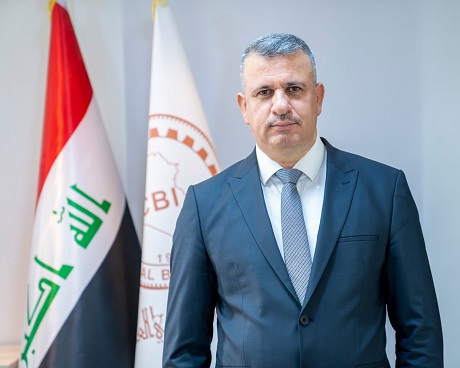#GrowingProspects – Part 3: The new Central Bank strategy for lending to the private sector

This week, the Central Bank of Iraq published its first National Strategy for banks’ increased lending to the private sector. Through the strategy, the Central Bank aims to promote private sector growth in Iraq by facilitating access to bank credit for small, medium and large enterprises. In doing so, the Central Bank is addressing the current gap between the private sector's demand for financing and the supply of this financing by financial institutions.
On this occasion, Peter Jonath, GIZ’s Head of the ‘Strengthening Public Finances and Financial Markets in Iraq’ Project, interviewed Dr Ammar Khalaf, the Deputy Governor of the Central Bank of Iraq. Dr Khalaf chaired the committee that drafted the strategy and explains what the Central Bank aims to achieve with the strategy.
Peter Jonath: What does the CBI want to achieve with the bank lending strategy?
Dr Ammar Khalaf: The new National Strategy for Bank Lending to the private sector is an important milestone for the Central Bank of Iraq. In the new strategy, the Central Bank has defined key objectives to strengthen the role of small, medium and large enterprises in the Iraqi economy by providing them with adequate financing on favourable terms. We want to achieve this by increasing the level of financial depth - in other words the provision of financial services and their efficiency - by encouraging financial intermediation through various financial institutions, especially banks, to bring together more investors and borrowers. Along with this, we seek to improve financial inclusion by making financial products and services more accessible, and by promoting the use of financial services offered by formal financial institutions. This increased provision of financial support and facilities is targeted at the real economy, with the aim of also reducing informal economic activities.
Peter Jonath: Why is the strategy needed?
Dr Ammar Khalaf: The bank lending strategy identifies the current strengths, weaknesses, opportunities and threats of bank financing in Iraq and defines appropriate ways to improve financial intermediation involving relevant government agencies and private stakeholders. In this way, the strategy helps the Central Bank to mobilize various efforts to achieve an important strategic objective for the Iraqi economy: increasing the depth of the banking system and the level of financial inclusion, as well as ensuring the safety and stability of the financial sector in general. At the same time, the strategy serves as a roadmap with clear axes and objectives that help the monetary authority to regularly assess the achievement of targets and quickly address deviations. The strategy is a practical tool, based on scientific quantitative and qualitative analysis, for setting targets and striving to achieve them in a way that serves the public interest within the government's program.
Peter Jonath: Why is the strategy a turning point?
Dr Ammar Khalaf: The strategy allows the monetary authority to set clear main and intermediate targets and define instruments to achieve financial deepening and private sector growth – goals which are extremely difficult to achieve due to the market forces under the financial system liberalisation that Iraq has adopted since 2004. To this end, the strategy enables the Central Bank, in coordination with the relevant government authorities, to mobilise resources and efforts to achieve these important goals, including increasing the level of financial depth and financial inclusion. The strategy also provides a framework for partner institutions and stakeholders to carry out their own legislative and administrative reforms to facilitate local and foreign investment, strengthen the role of formal businesses and enhance the role of the financial sector in economic development.
Peter Jonath: What will happen in the next months and years?
Dr Ammar Khalaf: In the next weeks, we will set up an executive committee at the Central Bank with specialized working teams to follow up on the implementation of the strategic objectives. We will also assemble specialised teams, with the participation of relevant authorities from the public and private sectors, to undertake the necessary legislative and administrative reforms. Thus, we facilitate the registration of informal enterprises and start-ups and provide appropriate bank lending services and credit guarantees. The implementation of the strategy will be guided by quarterly reports on the achievement of the objectives set, as well as by quickly addressing the problems and challenges facing the implementation.
Peter Jonath: Dr. Khalaf, many thanks for your time and insights.
------
The development and implementation of the CBI’s National Strategy for Bank Lending in Iraq is supported by the Strengthening Public Finances and Financial Markets project, which is part of the Team Europe Initiative in Iraq (#TAEUFIQ). The project is implemented by GIZ and funded by the European Union and the German Government.